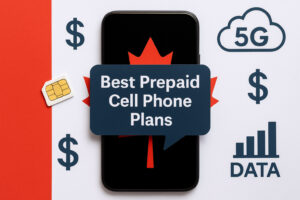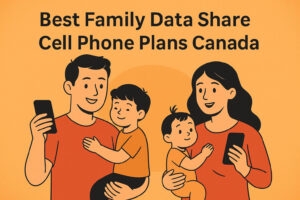Welcome to the new era of connectivity. As of 2025, Canada’s 5G network has fully matured, moving from a novel luxury to an everyday essential. With this evolution comes a dizzying array of phone plans, all promising lightning-fast speeds and “unlimited” data. But how do you separate the marketing hype from the actual value? This guide is your definitive resource. We have gone beyond the surface level pricing to conduct a deep dive into the offerings from Canada’s key players, including Rogers, Bell, and Telus, their value-focused flanker brands like Koodo and Fido, and the budget-friendly disruptors like Public Mobile and Freedom Mobile. We will break down the real costs, the hidden catches, and help you choose the absolute best plan for your specific needs.
How We Determined the Best Plans
Our analysis is grounded in a real-world value assessment. We did not just look for the cheapest price. We evaluated each plan based on four core pillars: the total monthly cost including common discounts like autopay, the amount of high-speed 5G or 5G+ data, the reliability and reach of the underlying network, and the value of extra perks like roaming, family sharing, and bundle savings.
- Total monthly cost: Base price plus typical credits or autopay savings.
- High-speed data: Size of the full-speed 5G or 5G+ bucket before throttling.
- Network reliability: Coverage footprint and performance in real-world conditions.
- Perks and bundles: Roaming, family sharing, member benefits, and home service bundles.
The Big Picture: Understanding the Tiers of Canada’s Mobile Market
Before diving into specific plans, it is helpful to understand that Canada’s market is split into three distinct tiers. Your choice will likely come from one of these categories.
The Premium Powerhouses
Rogers, Bell, Telus. These carriers offer the largest data buckets, the fastest 5G+ speeds, and the most perks, but at the highest price.
The Smart Value Champions
Koodo, Fido, Virgin Plus. Owned by the big three, these brands use the same reliable networks but offer simpler plans with fewer frills for a significantly lower price.
The Ultra Budget Disruptors
Public Mobile, Freedom Mobile. These providers offer the lowest prices by operating with different business models, such as all digital service or a more limited native network supplemented by partner coverage.
Tier 1: The Premium Powerhouses
These are the flagship carriers. You choose them when you want the best of everything, including speed, data, and features, and are willing to pay for it.
Rogers: The Data King
| Item | Details |
|---|---|
| Flagship Plan | 5G Popular 175 GB |
| Price | $100 per month, or $90 per month with automatic payments |
| Network and Speed | Access to the full Rogers 5G and 5G+ network |
| Highlights | Large 175 GB bucket of high speed data, premium device financing options, and valuable perks such as US and Mexico roaming on higher tiers |
Deep Dive: The 175 GB plan is a statement piece. It is designed for professionals who tether laptops, families sharing a single large pool, or anyone who streams 4K video on the go. Rogers 5G+ provides the fastest available speeds in supported areas. The real value often lies in extras. Bundling with Rogers home internet can unlock additional discounts, and roaming packages are strong for frequent travel to the United States.
The Bottom Line: If your priority is the largest possible data bucket and premium perks, Rogers is an excellent, although expensive, choice.
Bell: The Speed Demon
| Item | Details |
|---|---|
| Flagship Plan | Ultimate 100 |
| Price | About $90 per month with autopay and a bundle discount for Bell Internet |
| Network and Speed | Bell’s national 5G and 5G+ network |
| Highlights | Generous 100 GB of full speed data with potential bundled perks, historically including services such as Crave or innovative tools |
Deep Dive: Bell’s strategy is built around its ecosystem. While mobile plans are strong on their own, they become significantly more compelling when bundled with Bell Fibe internet and TV. This can result in savings that make the effective cost much more competitive. The 5G+ network is consistently among the fastest in Canada.
The Bottom Line: An ideal choice for speed focused users, especially those already within or willing to join the Bell home services ecosystem.
Telus: The Customer Champion
| Item | Details |
|---|---|
| Flagship Plan | Peace of Mind Connect 120 GB |
| Price | About $95 per month with autopay |
| Network and Speed | Access to the national 5G and 5G+ network |
| Highlights | Excellent for families, with data sharing across multiple lines from a large pool and strong customer satisfaction |
Deep Dive: Telus shines for families. Instead of buying several separate plans, a family can purchase one massive shared bucket at a lower total cost. While there may be fewer flashy media perks, Telus focuses on a reliable, user-friendly experience supported by strong service.
The Bottom Line: The best premium option for families or anyone who prioritizes a smooth, frustration-free customer experience.
Tier 2 and Tier 3: The Best of the Budget-Friendly Carriers
For many Canadians, the best value is not found with premium brands. It is in the competitive world of the flanker and budget carriers, where you can get all the data you need for a fraction of the price.
Public Mobile: The Unbeatable Value Leader
| Item | Details |
|---|---|
| Notable Plan | Unlimited Canada and United States Talk and Text with 60 GB |
| Price | Typically around $36 to $40 per month |
| Network and Speed | Full access to the Telus 5G network |
| Highlights | Incredible amount of 5G data for the price on a top tier network |
Deep Dive: The trade off is support and model. There is no phone number to call for service. Everything is handled through online forums and chat. There are no physical stores and no device financing. Public Mobile is moving to an eSIM only model, so your phone must support eSIM. If you are comfortable with a digital first, self serve experience, the value is unmatched.
The Bottom Line: If you have a compatible phone and like a digital only experience, this is the best value 5G plan in Canada.
Freedom Mobile: The Resurgent Disruptor
| Item | Details |
|---|---|
| Notable Plan | 5G Unlimited with United States and Mexico Roaming |
| Price | Often around $50 per month for 75 GB or more |
| Network and Speed | Freedom’s own 5G network in major cities with partner roaming elsewhere |
| Highlights | Generous data amounts and frequently includes United States and Mexico roaming in the base price |
Deep Dive: Freedom’s model requires awareness of coverage. In major urban areas such as Toronto, Vancouver, and Calgary, you are on Freedom’s native 5G network. Outside those zones you roam on a nationwide partner network at no extra cost, although high speed roaming data may be capped. For many city residents this is a strong, cost effective option.
The Bottom Line: A compelling value for city dwellers, especially frequent travelers to the United States or Mexico.
Koodo Mobile and Virgin Plus: The Reliable Middle Ground
Koodo from Telus and Virgin Plus from Bell offer a balanced approach. You get the reliability of a tier one network and phone support with simpler, more affordable plans. While they were slower to push 5G, many core plans now include it.
- Koodo: Shock Free Data pauses data at your limit to prevent surprise charges. Plans are straightforward and customer friendly.
- Virgin Plus: Member Benefits provide ongoing discounts on entertainment and retail. Plans are easy to understand and pair well with Bell home services.
The Bottom Line: Excellent choices for users who want a fair price and good support without the complexity of premium plans or the self serve model of ultra budget carriers.
So, Which Plan Should You Actually Get? A Final Verdict
| If You Are | Your Best Bet | Why |
|---|---|---|
| The Power User (You use 100 GB or more, tether often, and want perks) |
Rogers 175 GB Plan | The largest data bucket and premium features for a true worry free experience |
| The Savvy Saver (You want the most 5G data for the lowest price) |
Public Mobile 60 GB Plan | Unbeatable value with a top tier network at less than half the price of premium plans |
| The Urban Roamer (You live in a big city and travel to the United States or Mexico) |
Freedom Mobile | Low domestic pricing plus included international roaming is rare and valuable |
| The Set It and Forget It User (You want a fair price, reliable network, and good support) |
Koodo or Virgin Plus | A hassle free middle ground with the backing of Canada’s best networks |
| The Family Manager (You manage three or more lines and want simplicity) |
Telus Peace of Mind Connect | Shared data plans offer simplicity and strong total value for families |
Actionable Tips to Save on Your Monthly Bill
- Bring Your Own Device when possible: Device financing often locks you into expensive plans. Buying your phone outright and pairing it with a cheaper BYOD plan can save hundreds over two years.
- Use autopay and bundle discounts: Many carriers offer monthly savings for autopay and additional savings when bundling with home internet or TV.
- Shop during peak deal seasons: Back to School and Black Friday are the best times to find bonus data and bill credits.
- Right size your data: Review your last three bills to understand actual use. Choose a plan that comfortably covers your real usage rather than paying for excess headroom.
Frequently Asked Questions
What really happens when my unlimited data is throttled?
Once you use up your high speed data bucket, for example 100 GB, your speed is reduced to a throttled rate, often around 512 kbps. At that speed you can send and receive email, use messaging apps, stream music, and browse simple sites. High definition video, video calls, and online gaming will struggle due to buffering and lag.
What is the real world difference between 5G and 5G+?
Standard 5G is the modern baseline and is much faster than 4G LTE for most tasks. 5G+ often uses the 3500 MHz spectrum and delivers very low latency with speeds that can rival home internet in supported areas. It is great to have but standard 5G is more than sufficient for most users.
What is an eSIM and why do carriers like Public Mobile use it?
An eSIM is a digital, embedded SIM card. Instead of inserting a physical card, you activate service by scanning a QR code. Carriers save on manufacturing and logistics, and activation is fully online. The trade off is that your phone must support eSIM, which most newer models do.
Is it worth signing a two year contract for a new phone?
It depends on your needs and budget. Carrier financing is convenient if you need a new flagship phone, but it usually requires more expensive plans and can cost more over the term. Buying outright and choosing a BYOD plan typically delivers the best long term savings.






